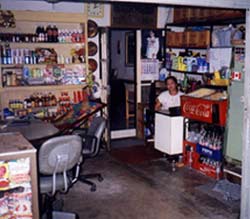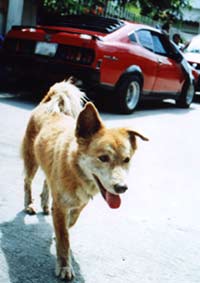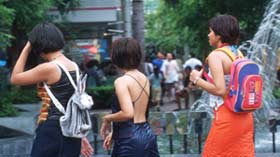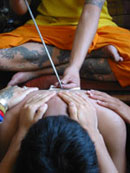Interview with a Shop Owner
It always amazes me when I go out with a group of friends and we end up spending more on a meal in a nice restaurant than many Thai people make in a month. I recently spent an afternoon talking with a Thai shop owner about how he gets and spends his money and about his country.
Mr. C lives in the eastern part of Bangkok in a relatively non-descript residential neighbourhood. He is a friendly, open, and mellow guy. His townhouse looks like most of the others. The front of the house, which would usually be used as a covered parking area, has been converted into a small shop.
The shop sells basic necessities such as soft drinks, snacks, beer, soda, cigarettes, cleaning products, and canned and bottled groceries. Entering into the house through the shop there is first a large living room and dining area, a long narrow kitchen in the back, and one bathroom. Upstairs there are two modest-sized bedrooms and one more bathroom. The total living space is about 76 square metres. Both he and his wife work in the store.
Both he and his wife work in the store.
Mr. C is married and is about 50 years of age. His wife, daughter (age 19), and niece (age 22) live with him. Both his daughter and niece are students. He earns about 40,000 baht/1,000 US dollars a month, which is well above average in Thailand.
The United Nations Statistics Division figures in 1998 showed an average annual income for Thailand of 1,890 US dollar. This is 6,300 baht or US$157.50 per month. Mr. C is doing well.
Mr. C owns three telephones, two television sets, two stereos, four radios, two video cameras, two video players, one motorbike, and two automobiles.
He owns his own house. He spends 12,000 baht (300 US dollars) a month on food and 1-2,000 baht (25-50 US dollars) a month on electricity because he does not use air-conditioning. He spends 800 baht (20 US dollars) a month on transportation. This is a low figure but Mr. C is a homebody and does not like to travel much. He earns about 3,000 baht (75 US dollars) a month from his small store. The logical question is where does the other 37,000 baht come from? The answer is an interesting one.
US dollars) a month from his small store. The logical question is where does the other 37,000 baht come from? The answer is an interesting one.
Mr. C worked in Bangkok for 12 years and saved his money. He bought some land in Rayong, which is on central eastern coast of Thailand. One 20 rai (8 acre) lot of land cost him 70,000 baht (1,750 US dollars) and the other 20 rai lot cost him 50,000 baht (1,250 US dollars). The family lived in Rayong until one day when they were robbed. They decided to return to Bangkok and sold the two lots for a total of 400,000 baht (10,000 US dollars), giving them a nice 280,000 baht (7,000 US dollar) profit.
Ironically, one of the lots Mr. C used to own recently sold for 35 million baht (875,000 US dollars). The town of Rayong has become as bustling seaside community for vacationers and tourists.
Upon returning to Bangkok, Mr. C bought his house for 330,000 bath (8,250 US dollars). He then subdived the house into two smaller townhouses, selling one for 380,000 baht (9,500 US dollars). Mr. C has purchased and rented out a handful of other apartments in his area. He has also lent money to his brother through the years and receives interest due on this loan.
townhouses, selling one for 380,000 baht (9,500 US dollars). Mr. C has purchased and rented out a handful of other apartments in his area. He has also lent money to his brother through the years and receives interest due on this loan.
His dream for the future is to own a Ferrari F40 and his most prized possession is his 25 year old red Mitsubishi GTO. When asked what he thinks the biggest problem facing his country is he replied, “Thai people follow foreign ways too much these days. They are too ready to accept Western values without even questioning them. We are told very often that being Thai is not good and that anything from the West is cool.”
As an example he mentioned a recent radio commercial for a psychic hotline that tells Thais to stop believing in their old superstitions. The commercial sites the belief that when a lizard makes a clicking sound when you leave your house it means bad luck. The commercial says this is nonsense, and that instead one should rely on their modern hotline to get real information. The motto of the advertisement is ‘out with the old and in with the new.’
When asked how he views foreigners living in Thailand (called ‘Farang’ in Thai) he stated, “They tend to look at Thais as employees and as being stupid. They are not interested in Thais or in Thailand. They are selfish and always think of themselves first.”
When I asked him how a Thai is different he answered, “Thais are more ready to help each other and have more of a sense of community. Foreigners tend to have a ‘you do something good for me and then I will do something good for you’ one on one sense of helping.”
Mr. C said when he was a child he was always very excited to see foreigners. Now he thinks foreigners are not that much better than he is. When asked about other thoughts on foreigners Mr. C. said, “Thais always take the slow road and foreigners always take the expressway.”
